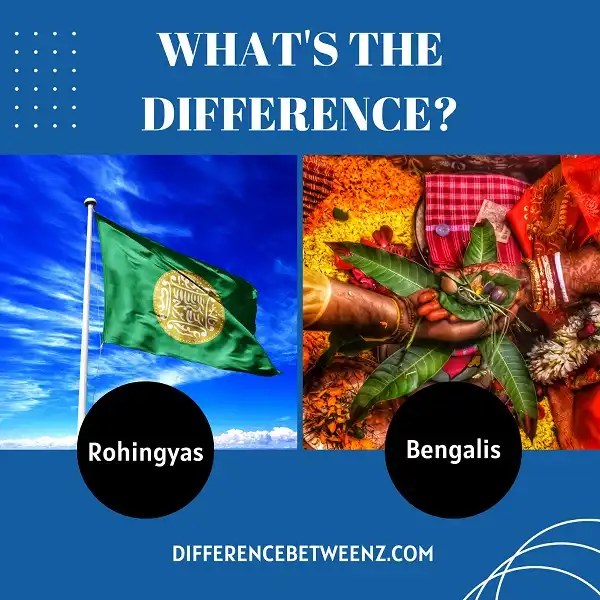The Rohingyas are an ethnic minority that is indigenous to the Rakhine State of Myanmar. The majority of Rohingya people are Muslim, and they have faced religious and ethnic persecution in Myanmar for many years. Bengalis, on the other hand, are a nationality that is indigenous to Bangladesh. Most Bengalis are Muslim as well, but they have not faced the same level of persecution as the Rohingyas. There is a lot of confusion about the difference between these two groups, so I wanted to write a post explaining the difference in more detail.
Who are Rohingyas?
Rohingyas are a Muslim minority group who have lived in the Buddhist-majority country of Myanmar for centuries. Rohingyas speak their own language and have their own culture and traditions. however, they are not recognized as an official ethnic group by the Myanmar government.
- This means that Rohingyas do not have full citizenship rights and are not allowed to vote or hold public office. Rohingyas have faced discrimination and violence from both the Myanmar government and Buddhist residents of Myanmar.
- In 2017, a military crackdown led to mass displacement and a humanitarian crisis, with hundreds of thousands of Rohingyas fleeing to neighboring Bangladesh.
- Rohingyas are now one of the largest groups of displaced people in the world. While many Rohingyas remain in camps in Bangladesh, some have also made the dangerous journey to other countries in Southeast Asia in search of safety.
Rohingyas face challenges wherever they go, as they are often treated as illegal immigrants and denied basic rights and services. The international community has called on the Myanmar government to end the discrimination against Rohingyas and allow them to return to their homes in Myanmar. However, little progress has been made so far.
Who are Bengalis?
Bengalis are an ethnic group native to the Bengal region in South Asia, which is today divided between Bangladesh and the Indian state of West Bengal. Bengalis are the third largest ethnic group in the world, after Han Chinese and Arabs.
- Bengalis have a long and rich cultural heritage, with distinctive cuisine, music, and literature. Bengalis are also known for their love of art and their passion for Bengali cinema.
- In recent years, Bengalis have been making a significant contribution to the global economy, with many Bengalis working in top banks and financial institutions.
- Bengalis are also active in politics and social activism, and there is a strong Bengali diaspora community around the world. Bengalis are a proud and courageous people, with a rich history and culture that is unique and distinct.
Difference between Rohingyas and Bengalis
- Rohingyas and Bengalis are two groups of people who share a similar culture and language. However, there are also some important differences between them. Rohingyas are often seen as being more devout Muslims, while Bengalis are generally more secular.
- Rohingyas also tend to be poorer and less educated than Bengalis. Additionally, Rohingyas have been the target of violence and persecution in their native Myanmar, while Bengalis have not.
- These factors have led to tension between the two groups, and in some cases, violence. However, it is important to remember that there are many similarities between Rohingyas and Bengalis and that they are both ultimately people who deserve to be treated with respect and dignity.
Conclusion
The Rohingya people are a Muslim minority group who have been persecuted in Myanmar for years. They are not recognized as citizens of the country and have very few rights. The Bengali people, on the other hand, are the majority ethnic group in Bangladesh. They are also Muslims, but they have been living in Bangladesh for centuries. There is a lot of tension between the Rohingya and Bengali people, and it has led to violence in the past.


